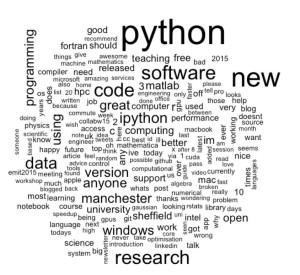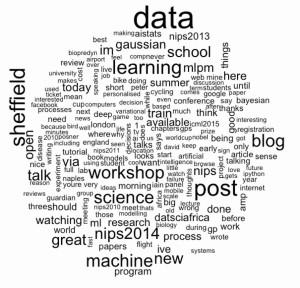Archive for the ‘The internet’ Category
A recent trend on Facebook is to create a wordcloud of all of your posts using an external service. I chose not to use it because I tend to use Facebook for personal interactions among close friends and I didn’t want to send all of my data to another external company.
Twitter is a different matter, however! All of the data is open and it’s very easy to write a computer program to generate Twitter world clouds without the need for an external service.
I wrote a simple script in R that generates a wordcloud from the most recent 3200 tweets and outputs the top 200 words (get the code on github). The script removes many of the uninteresting words such as the, of, and that would otherwise dominate the cloud. These stopwords come from the Top100Words list of the R package qdap but I also added a few more such as ‘just’ and ‘me’ that I seem to use a lot.
This is the current wordcloud for my twitter account, walkingrandomly. Click on the image to see a bigger version. My main interests are very clear – Python programming, research software, data and anything that’s new!
Once I had seen my wordcloud, I wondered how things would look for other twitter users who I pay a lot of attention to. This is how it looks for Manchester University’s Nick Higham. Clearly he’s big on SIAM, Manchester, and Matrix Analysis!
I then looked at my manager at Sheffield University, Neil Lawrence. Neil finds data and the city of Sheffield very important and also writes about workshops, science, blog posts and machine learning a lot.
The R code that generated these wordclouds is available on github but it won’t work out of the box. You’ll need to register with twitter for app development (It’s free and fairly straightforward) and get various access keys before you can use the code.
Wakelet is a new content curation platform that I’ve been playing with recently and I have to say, I like it a lot! Here’s a screenshot from one of my wakes, ‘Best of WalkingRandomly’ where I’ve gathered together some of the most popular pages here.
A ‘wake’ is a collection of images, notes, comments and links. It sounds simple, and it is, but I’ve found it very useful for all kinds of stuff. For example, whenever I find an interesting article about scientific computing, I usually post it on my twitter feed – https://twitter.com/walkingrandomly. I’ve done this for hundreds of links but they are difficult to subsequently look up. With this in mind, I’ve started adding some of the best links to my Scientific Computing wake.
Wakelet is developed by a group in Manchester and I first learned about it because one of my friends is a developer there. At first, I dutifully played with it because of his involvement but I’ve continued using it’s really rather good! Read more about wakelet:
I follow a lot of software developers on twitter so I get to see a lot of opinions and comments about git. Here are a few of my recent favourites
Opinions on git
I find that git is a technology that polarizes people. They either love it or they hate it…often both at the same time.
I didn’t know git would make make programming more addictive. Ups frequency of reward, via miniature accomplishments: commits.
— Alex Holcombe (@ceptional) November 12, 2014
Every time you write, “learn git” and follow this advice with “it’s dead simple!” a kitten cries.
— Anja Boskovic (@damedebugger) November 7, 2014
tries to teach 2 lab groups “git & github” .. actually spends most of the time working on installing/setup. oh Twitter. Just hold me.
— Andrew MacDonald (@polesasunder) November 6, 2014
Git Tutorials
I find that I learn something new every time I read a different tutorial
http://t.co/0OLz7jeghF walkthrough git from internals to (hopefully) better beginners/intermediate usage. Feedback welcomed!
— mrchlblng (@marchelbling) November 12, 2014
[new post] 5 Simple Git Power Tools: http://t.co/bpwRzMJYkx pic.twitter.com/PnAvwW8mcQ
— Jon Reid (@qcoding) November 11, 2014
There’s a new version of the Pro Git Book, and you can read it for free online http://t.co/LaIikATlk1
— Mike Hay (@Hay) November 7, 2014
Git tips and tricks
No matter how long you’ve used git, you can always learn a new trick or two.
duh! Didn’t know about git clean -fdx to clean out gitignored files. I’d been using powershell cmd to del bin/obj & manually del pkg folder
— Julie Lerman (@julielerman) November 6, 2014
alias hadouken="git push origin master -f"
— Chris Oliver (@excid3) November 6, 2014
How to Git Pretty http://t.co/w0CbWYwvvr +@bobthecow pic.twitter.com/AADRNFpuC3
— Elijah Manor (@elijahmanor) November 5, 2014
Here in the UK, this morning’s news is dominated by the Gameover Zeus virus and how it can hold you to ransom, empty your bank accounts and generally ruin your day!
The usual good advice on how to protect yourself from such attacks is doing the rounds but I wondered how effective one extra precaution might be: Only ever log into bank accounts etc using a dedicated device.
I’m seriously considering doing this since internet-capable devices are very cheap these days. While I’m at it, I’m thinking of taking the following extra precautions:
- Install Linux on the dedicated device since it is not targeted by hackers as often as Windows-based devices are.
- Create dedicated email addresses for each bank account. That way, if my normal email account were compromised, my bank accounts would still be safe.
Obviously, such a scheme would be less convenient than using whichever of my current devices I happen to be using but I’d rather that than be robbed of everything.
What do you think? Would such a scheme offer any additional protection?
When I first started this blog, there were only really two methods by which readers could keep up with new content – by subscribing to the RSS feed or by regularly dropping by the site to see what’s new. Since then readers have steadily been requesting other ways to follow the blog and, for the most part, I have obliged. Here’s a list of current methods:
- Subscribe to the RSS feed
- Follow me on Twitter – I post every WR article to my twitter feed along with whatever else I find interesting. Twitter is also a great way of contacting me and is the social media platform on which I am most active.
- WalkingRandomly on Facebook – A small following compared to the other channels but useful to some it seems.
- Drop by the site whenever the mood strikes you
Google Reader has been a part of my life for several years now, forming the basis of my news reading habits. Barely a day goes by that I don’t use it via my Android phone, iPad or the web and I have dozens of feeds effortlessly synced across all platforms. It is, along with Dropbox, one of the most useful cloud services I have signed up for…and now its gone.
I guess I shouldn’t complain too much–after all it is a free service just like Twitter, Facebook, Evernote, Dropbox, Gmail, etc and so Google has every right to yank it away from me if that’s what they want to do. What the cloud giveth, the cloud taketh away and all that.
What if your favourite cloud-based service was switched off?
This has led me to face up to something I’ve always had at the back of my mind but, until now, never really worried about too much– I rely far too much on services that are potentially ephemeral and I have no control over. The loss of Google Reader from my life is frustrating but hardly the end of the world. The loss of something like Dropbox, Evernote, Facebook or Gmail would cause me a lot more pain.
The data I upload to these services may be mine but the platforms are not and since I don’t pay a penny for any of them (Dropbox being a major exception) I am not sure what my legal rights may be. If, for example, a company such as Evernote were to suddenly say ‘This free-access stuff isn’t working out for us so we deleted all your stuff and closed your account, thanks for playing.’, would I have any legal recourse? Even more importantly, would I have a local backup?
Longevity and owning your own platform.
Another issue to consider is longevity. Over the years I have invested time and money in dozens of software applications and, apart from a few notable exceptions where the licensing was crazy, I can still run any one of them today. Languishing in the depths of my hard drives are files so old that they can only be read by ancient applications written by long-dead software development companies yet I can still launch the application and access the data. I can do this because I physically own the platform. The only way someone could prevent me from using the software and data on this platform is to physically take it from me.
To prevent me from using a cloud based service, however, it seems that all it takes is for that service to become unpopular.
I like the StackOverflow range of question and answer sites and have hopped on and off them almost since the very beginning. When I logged in recently I was informed that one of my questions had been awarded the ‘Famous Question’ badge..i.e. it had been viewed over 10,000 times. The relevant question was Python blogs that you regularly follow? which was asked by me in the very early days of the site. Not only has it received 63 community up-votes and over 10,000 views but it’s also been closed as ‘Not constructive’ by senior members of the Stack Overflow community.
I find this contrast amusing!
I’ve been getting emails recently from people asking if I can mirror my RSS feed onto a twitter account since they look at Twitter more than Google Reader! Not wanting to disappoint, I have created a Twitter feed just for Walking Randomly called, predictably enough, @walkingrandomly. The new feed will include links to all new Walking Randomly articles as they happen and will also be supplemented by links to other websites that I find interesting.
If you are interested in hooking your RSS feed to a Twitter account in this manner then check out Twitterfeed.com.
Back in August 2008, Joel Spolsky and Jeff Atwood launched a question and answer site aimed squarely at programmers and it has been a massive hit. Called Stack Overflow, the site currently contains over 330,000 questions and answers covering pretty much every aspect of programming you care to mention from What IDE to use for Python through to smart pointers in C++ and everything in between. With a userbase running into the thousands, you can be sure that someone, somewhere will know the answer to your programming question no matter how obscure. All this and yet, in true internet tradition, it won’t cost you a penny.
Well, time moves on and Stack Overflow spawned other sites based on the same web technology. Server Fault, for example, is aimed at system administrators and finally, to complete the trilogy, we have Super User which is geared towards general computer enthusiasts. Although neither of these have been as popular as the original programming site (Server Fault currently has 17,000 questions and Super User has just over 12,000) they are still very useful resources. More importantly, they demonstrate that you can use the Stack Overflow technology to build any community question and answer site.
I guess it was inevitable that someone would eventually build such a site for mathematics. Math Overflow is currently in the beta stage of development and only contains just under 400 questions at the time of writing but it has potential. It just needs a bigger audience, so head over there and get questioning.
I guess you could think of it as a people-powered version of Wolfram Alpha!
When I first came across Twitter, the micro-blogging site that allows people to follow your interests (and your life if you like) by answering the question ‘What are you doing?” I thought it was completely and utterly pointless. Most of my friends agreed.
I move in very geeky circles though and while at BarCamp Sheffield last year, someone convinced me to sign up and give it a try. To start with, all it did was confirm my initial suspicions – it seemed to be pointless. I knew when my geek friends were in the office, I knew what they were having for lunch, when they were having problems with Java and when they were being bit on the toe by their pet ferrets, Ruby and Perl. Pointless and yet strangely compelling.
In a week I was hooked.
Since then, not only have I found it to be compelling but I have also found it to be immensely useful. Just last week, for example, I was stranded in Manchester and needed a cheap hotel room. Although my phone has Internet, it’s very slow, so I didn’t want to have to spend ages googling for the best deal so I tweeted to my small band of followers that I was stuck and I needed help. They came through for me with first class form and I was soon in a nice, comfortable room that included breakfast for under 50 quid.
I have used it to help solve technical problems, arrange impromptu gatherings, follow the world’s reactions to Wolfram Alpha’s launch in real time,get more readers for this blog, get advice on learning German and, of course, to tell the world what I am having for lunch.
Some people find it significantly more useful though – Dell used it to boost sales of their computers by $3million apparently!
More recently, I have noticed that the makers of various mathematical software packages have started getting in on the tweeting act and the results can be interesting. Following the tweets of organisations such as Mathworks and OriginLab can be a great way to keep abreast of blog posts, interesting technical tidbits and new releases among other things. Some of the better Twitter feeds (Labview’s for example) encourage a public two-way dialog between the application vendor and its users – a trend that I hope will continue.
Here are a few I have found so far, some better than others.
- labview – An official feed from National Instruments
- Maplesoft – The official feed of the makers of maple
- MATLAB_Webinars – Seems to be an ‘official’ Mathworks feed.
- matlabDoug – The feed of Mathwork’s employee, Doug Hull.
- OriginLab – Official feed from OriginLabs – The makers of plotting software, Origin. Feed only just started.
- sagemath – Not sure if this is official. Could do with being updated more often.
- Wolfram_Alpha – Official feed of Wolfram Alpha. Includes lots of interesting Wolfram Alpha inputs.
Let me know if you find any more and I’ll add them to the list.





